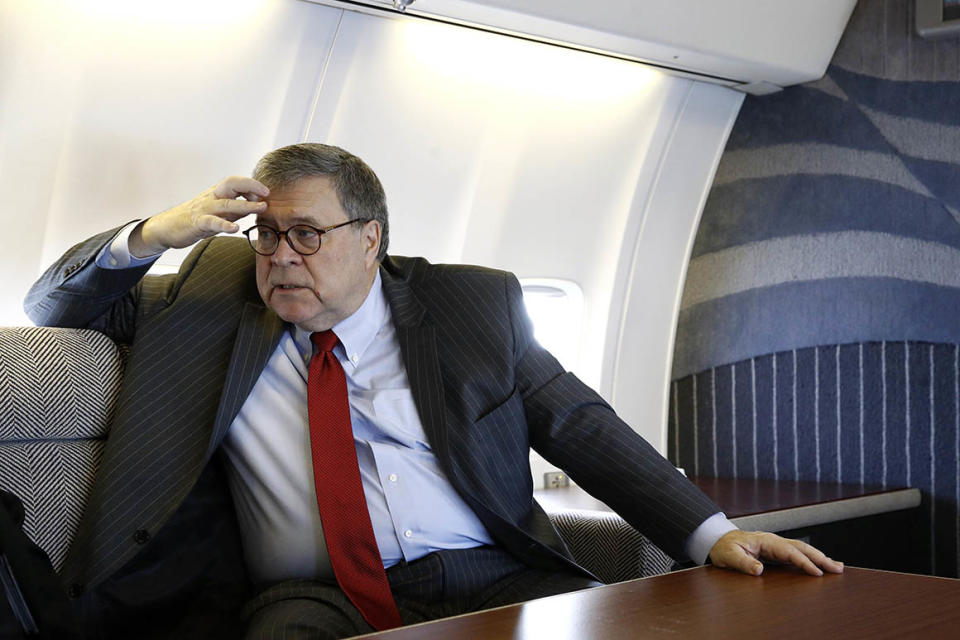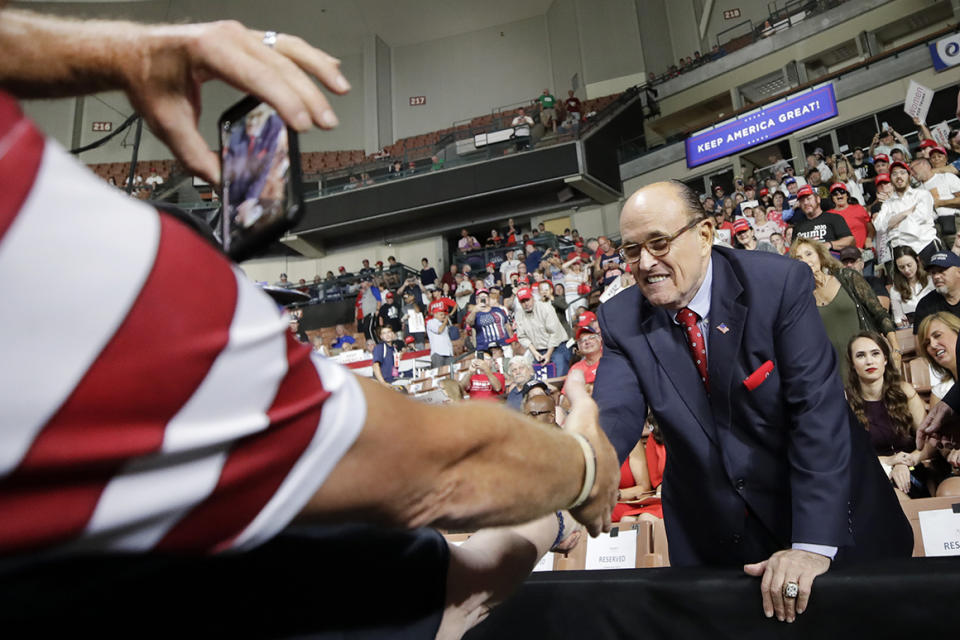Justice’s election-year conundrum: How to probe team Trump
The Justice Department is in another election-season jam — faced with politically loaded decisions over how aggressively to investigate President Donald Trump and his allies in the heat of the 2020 campaign.
Legal experts see signs that DOJ is laying the groundwork for a potential criminal probe into whether the president and his top advisers broke federal laws by withholding a White House meeting and nearly $400 million dollars in foreign aid from Ukraine unless the country’s new leaders agreed to investigate Trump’s political rivals.
In Washington, the FBI has already contacted an attorney for the whistleblower who first revealed the scheme. In New York, federal prosecutors are expanding a probe into Rudy Giuliani, Trump’s personal attorney, who played a pivotal role in the Ukraine campaign. And on Capitol Hill, lawmakers busy with impeachment are collecting documents and testimony that could help fuel any DOJ probe into the president and others around him who were involved in the scheme.
“We’ve done investigations based on a lot less than what we’ve heard already,” said Mimi Rocah, a former assistant U.S. attorney from the Southern District of New York.
But the ghosts of 2016 linger. DOJ and FBI leaders are still weathering bipartisan scorn for their handling of dual election-year probes into Hillary Clinton’s use of a private email server and the Trump campaign’s Russia connections. Any moves to examine Trump as 2020 heats up will receive similar scrutiny — as will any choice not to examine Trump.
It all adds up to a tumultuous year ahead for Attorney General William Barr, who has struggled to maintain the department’s historical reputation for independence while serving a president who openly castigates federal law enforcement for leading a “coup” to unseat him.

“This is a dereliction of duty by Bill Barr to not treat this as a criminal matter. It’s Bill Barr protecting the president,” said Rep. Joaquin Castro, a Texas Democrat on the House Intelligence Committee, which has been leading the impeachment inquiry into Trump’s behavior. “The way to handle it would have been to appoint a special counsel to investigate all these matters.”
DOJ hasn’t exactly delivered a coherent message on what elements of the Ukraine scandal it might be investigating.
The confusion started in late September when a department spokeswoman, Kerri Kupec, issued a statement saying Trump had been cleared of any campaign finance violations that might stem from his July 25 call with Ukraine’s new president, Volodymyr Zelensky. It was during that call that Trump asked Zelensky to do him a “favor” and open probes into former Vice President Joe Biden, a possible 2020 rival, and unsubstantiated allegations of Ukrainian meddling in the 2016 U.S. presidential election.
“All relevant components of the department agreed with this conclusion, and the department has concluded the matter,” Kupec said of the Trump call.
But a senior DOJ official also said Kupec’s Sept. 25 statement shouldn’t be taken as the final statement on the matter. Instead, the person said Kupec was speaking only to the specific issues the inspector general had raised after reviewing the whistleblower complaint about Trump’s actions toward Ukraine. The comment, the official said, shouldn’t be seen as ruling out the possibility that DOJ would examine other issues tied to the Trump-Zelensky call.
Legal experts and several Democratic lawmakers say those other issues could include a conspiracy to commit bribery and extortion by conditioning an official government act — a presidential visit and the release of financial aid — on Ukraine’s opening of political investigations that Trump considered valuable. Trump’s actions also raise other potential violations of federal laws governing the solicitation of campaign contributions from a foreign national, the lawmakers and legal experts added.
A DOJ spokesperson declined to comment. Trump personal attorney Jay Sekulow referred questions about the president’s legal liability to the White House, which did not respond to a request for comment.
In recent weeks, the department has started to show an interest in some of the players central to the Ukraine plot.
In early October, federal prosecutors indicted two Giuliani business associates — Lev Parnas and Igor Fruman — on campaign finance charges. The charges covered actions that occurred while the two were working with Giuliani on a campaign to spread negative information about Marie Yovanovitch, the U.S. ambassador to Ukraine, with the goal of getting her ousted.
The Parnas and Fruman charges — both men have pleaded not guilty and a trial is possible in 2020 — appear to be part of a broader probe that is looking at numerous people in Giuliani’s orbit.
An assistant U.S. attorney from the Southern District of New York on the case told a judge last month that DOJ’s “investigation is ongoing” into the matter. And subpoenas it has obtained since the indictments have given a sense of where the investigation is leading.
One subpoena seeking documents went to Pete Sessions, a former Texas congressman who is widely believed to be referenced in the Parnas-Fruman indictment in connection with efforts to remove Yovanovitch. Another document request went to a firm launched by Brian Ballard, a prominent Trump fundraiser from Florida who did business with Parnas. William Taylor III, an attorney for Ballard Partners, said the firm is “cooperating” with SDNY.
Most recently, several media outlets reported that SDNY officials were also examining Giuliani’s consulting business for a bevy of potential federal crimes, including money laundering, campaign finance violations, obstruction of justice and wire fraud.
DOJ’s Washington headquarters also has an interest in Giuliani’s case.
That disclosure came out in a roundabout way. Last month, department spokesman Peter Carr issued a statement to The New York Times confirming DOJ had been poking around on a separate case involving at least one of Giuliani’s other clients. That case included a meeting between Giuliani and the department's criminal division chief, Brian Benczkowski, over the summer. The Washington Post last week identified Giuliani’s client as the Venezuelan energy executive Alejandro Betancourt Lopez, who has been under scrutiny for possible money laundering and bribery.
At the time the DOJ officials from Washington took the Giuliani meeting, Carr said, they were unaware of the concurrent SDNY investigation. The mix-up, POLITICO reported last month, was one of the reasons DOJ leaders later pressed the criminal division and the famously autonomous SDNY branch to more proactively work together and share resources on the Giuliani case.
Then there’s the whistleblower.
According to a person familiar with the matter, the FBI’s Washington, D.C., field office tried in late October to arrange an interview with the anonymous individual whose letter describing the Giuliani-orchestrated Ukraine pressure campaign kicked off the House impeachment proceedings.
The FBI agent contacted one of the whistleblower’s attorneys in a way that indicated the person was not the subject or target of a probe, the person said. Yahoo! News first reported the FBI’s outreach to the whistleblower attorney.
Combined, legal experts and lawmakers say, the different DOJ and FBI moves could indicate a federal probe that’s edging closer to the president.
But questions also remain about federal agents’ objectives, given a number of recent events.
The last time the department investigated the president — special counsel Robert Mueller’s multiyear probe — it stopped short of charging Trump with any crimes, citing an internal legal opinion that says a sitting president can’t be indicted while in office. The same issues would apply to the Ukraine situation.
Trump’s history of individually castigating law enforcement agents also weighs heavily on any decision to publicly poke around in the president’s business.
“Trump has made it clear that he perceives any scrutiny to be a declaration of war,” said Barbara McQuade, a former Obama-era U.S. attorney from Michigan. “Agents who investigate Trump and his associates put their careers in jeopardy, but I hope that the FBI would be undeterred.”
The FBI’s outreach to the whistleblower has similarly stumped experts. The move makes little sense, they said, because other administration officials and career government workers have since come forward to give Congress far greater detail about the situation the whistleblower outlined.
“I’m inherently suspicious, which is sad,” said Rocah, a distinguished fellow at Pace University’s law school who specialized in organized crime cases while working at SDNY from 2001 to 2017. “I would not have been suspicious of that, but I am because of Trump’s weaponization and Barr’s weaponization of DOJ for political purposes.”
Republicans dismissed questions that the president could be facing any kind of DOJ scrutiny for the Ukraine matters that have also been at the center of the impeachment probe.
“On what?” said North Carolina Rep. Mark Meadows, one of the president’s most outspoken congressional defenders. “They already came out with a position that there was nothing criminal about it.”
When asked about a potential conspiracy or bribery investigation, Meadows replied: “If there’s some way you can write this, it’s me laughing out loud.”
Giuliani also has scoffed at questions about his legal jeopardy.

“Ohhhhh, wow,” the president’s personal attorney said Nov. 23 when asked on Fox News if he were concerned about getting indicted. “Do you think I’m afraid? Do you think I get afraid? I did the right thing. I represented my client in a very, very effective way. I was so effective that I discovered a pattern of corruption that the Washington press has been covering up for three or four years.”
Presidential campaign politics are only going to make the Ukraine and Giuliani probes more challenging for DOJ as the calendar flips to 2020. Several of the Democratic White House candidates have already been debating openly whether Trump should face criminal prosecution for his behavior as president if he loses in November.
And DOJ is still on edge after its series of hotly contested 2016 decisions, including James Comey’s ill-fated decision as FBI director to publicly discuss the findings of the Clinton email probe days before Election Day.
DOJ and the FBI after are also set to receive more scrutiny early next month, when the department’s inspector general will publish a report examining the early stages of the government’s Russia probe. The document is expected to criticize some bureau leaders and low-level FBI officials who worked on the Russia probe, even though it is also expected to reaffirm that officials did not improperly spy on the Trump campaign, as the president has claimed, and that political bias did not taint the investigation.
“While the FBI cannot duck an investigation because it’s politically fraught,” said one former senior law enforcement official, “they would need this one like they need a hole in the head.”
Josh Gerstein contributed to this report.

